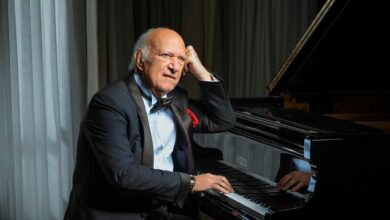Nihad Hadad, known to the Arab world as Fairouz, is considered by many to be the most important singer alive today in the Middle East. But the Lebanese diva, who at the age of 74 has made over one hundred albums, has not released original material since her 2002 album “Wala Keef?” (Or What, Exactly?). Instead, the “Ambassador to the Stars” has been embroiled in ongoing legal struggles for the right to perform most of her catalogue, which was composed almost entirely by her late husband, Assi Rahbani, and his brother, Mansour, whose sons brought the original court order.
Fans of the singer from Beirut to Cairo organized in support of her. Now comes hope for them, in the form of a new single, already on the radio, from a brand new album, appropriately called "Eih, Fi Amal" (Yes, There is Hope), rumored to be released in a few days.
For the past two years, the new album, previously titled “Allah Kbeer” (I Have my Faith in God), bounced from production company to production company in search of a producer and distributor. News outlets and gossip websites speculated relentlessly on its fate, with comments from the album composer, Ziad Rahbani (the son of Fairouz and Assi), assuring fans of the album's imminent release. For the first time, perhaps as a means of confirming the album itself, a single called “Essa Sgheeri Kteer” (A Very Short Story) is being played in anticipation of the larger work.
Radio Hits has the single on high circulation, accompanied by an announcement of the arrival of the new album by one of the high profile production companies in the Arab world, High Quality Production Company. To celebrate the album's release, Fairuz has scheduled two hotly anticipated concerts in Beirut.
Pessimism surrounding the release of the album was rooted mainly in the dispute over royalties, in which the heirs to Mansour Rahbani demanded that Fairouz stop performing songs written by their father until she shares a portion of the income generated by them.
But, according to Malak al-Najjar, a Lebanese lawyer, this court order does not include releasing new material. “Fairouz is free to release any new album without asking for permission,” says the lawyer, who is also a fan. “I believe, on a personal level, that the court order does not have any legal grounds to it.”
Back in July, when the news of the court order was announced, a gathering for fans and supporters of Fairouz was organized in the garden hall of Zamalek’s Sawy Culture Wheel. At that event, Al-Masry Al-Youm reporter Ekram Ibrahim talked to Mohamed al-Sawy, head of Sawy Culture Wheel, who said that "Fairouz is loved by everyone. I'm expecting many to attend to show their disagreement."
A source said that Fairouz appreciated the efforts of her admirers; the same source was quick to deny that those close to Fairouz triggered the protests in a bid to influence the court ruling. Claudia Marchalian, a Lebanese writer and an organizer of the solidarity campaign, said that the most important thing is to protect Fairouz, a national icon who has influenced generations of Arabs.
"Eih, Fi Amal," which is rumored to be released on 7 October, is already creating a buzz in the Gulf, where a mobile company bought the rights to release the songs as ring tones.
Fairouz's music has influenced many generations and is considered a milestone in the music scene in Lebanon and the Arab world. With her playful lyrics and angelic voice, Fairouz sings about being betrayed by matchmakers ("Adish Kan fi Nas"), children's love stories, ("Shadi"), and freedom, which she calls a "wild child" and a "fire rose" ("Ya Horreya").
A review of the long-awaited album, which is rumored on multiple entertainment websites to include 12 new songs, will be released in Al-Masry Al-Youm English Edition shortly after the release of the album.




